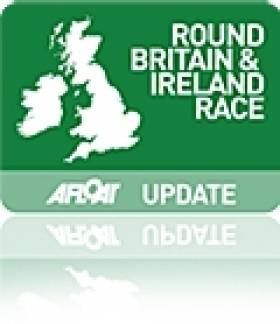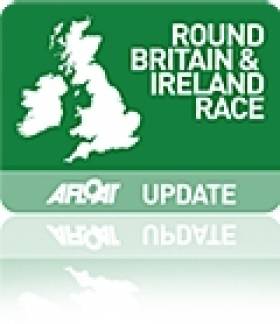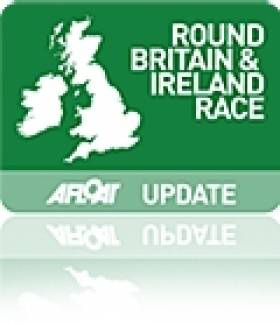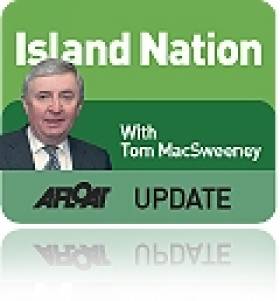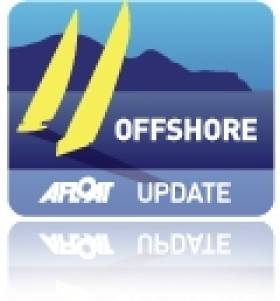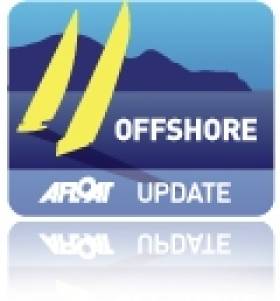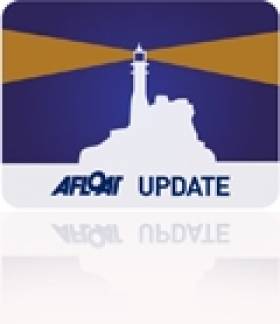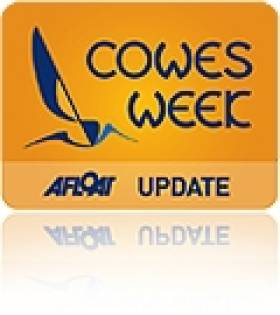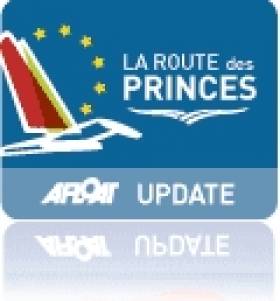Displaying items by tag: Damian Foxall
#rorcsrbi – Liam Coyne's First 36.7 Lula Belle, racing Two-Handed with Brian Flahive, is just west of Sunderland with 1450 miles to go, which means that the Dublin Bay pair from the National Yacht Club will have about a week at sea before they finish the Round Britain and Ireland race in one of the smallest boats in the fleet. From the start, Damian Foxall's Oman Sail-Musandam had 3 days and 3 hours to complete the course for the Sevenstar Round Britain and Ireland Race to set a new world record.
On Day Three of the race the trimaran's three hulls, sailed by Foxall, two British expats and three Omanis, are continuing to hammer on south. The lightening quick MOD 70 has hit the turbo charger, screaming along at 30 knots off the North West coast of Ireland. Currently Musandam - Oman Sail's expected finish time is approximately 1000 on Thursday morning, three hours inside the world record set by Loick Peyron's 140ft trimaran, Banque Populaire 5, in 2011.
"Records are there to be broken and it would be an honour to be bettered by such a great team," commented Loick Peyron by telephone to the Royal Ocean Racing Club. "Perhaps if they do set a new record it will also be good for the race. It will encourage other multihulls to come and try it - it is a fantastic course."
Abu Dhabi Ocean Racing's Azzam is leading the fighter formation of Volvo Ocean 65s that have now all rounded Out Stack and are heading home. At dawn this morning Azzam was passing Sula Sgeir, a remote island that marks the halfway point in the race and is best known for its population of gannets. However it is unlikely that the Volvo Ocean 65s, blasting along at over 25 knots, will have the chance to do much bird watching. Ian Walker, skipper of Azzam, called the RORC Media Team just after rounding Muckle Flugga at 2000 yesterday.
"The decisive factor in the race so far has been sail selection and timing of sail changes," commented Ian Walker. "Obviously you have got to go the right way, but that all ties in with where you decide to go and what sails you want to be on and then you can concentrate on putting the hammer down.
This has been a really tough race so far, right from the start, but we were all fresh for that and the North Sea was non-stop navigational decisions with oil rigs and sand banks on top of heavy conditions and sail changes. It is all about ragging it on deck, coping with the non-stop spray and pushing the boat as hard as we can. One thing we have seen in this race that we haven't seen in practice is being so close to the Spanish team - relaxing for just five minutes reflects in a loss.
The biggest call so far was as we approached Muckle Flugga, we stayed more to the west than the Spanish team. We spent four or five hours with the big sail on trying to get west so that we didn't get sucked up into the low pressure. We knew that as long as we had good wind speed we were inside the shift and, when we eventually gybed, the distance between us would become our lee. In the end the gybe call was very, very, difficult as the wind was very shifty. We gybed as late as we dared and just managed to just get round the top of the rocks. Navigating around a headland like that, with a 100 degree wind shift, was about as difficult as it gets and our navigator Si Fi (Simon Fisher) nailed it - we made quite a big gain."
IRC Overall
Jens Kellinghusen's German Ker 51 Varuna, racing in IRC Zero, is the new overall leader for the 20 strong IRC fleet. After time correction Varuna made the top of the leader board yesterday evening and, on the morning of Day Three, Varuna is estimated to have an eight hour advantage over Andrew Budgen and Fred Schwyn's Volvo 70, Monster Project.
However at 0700 BST, Varuna was still 70 miles from Out Stack with a complex weather scenario in front of them while Monster Project rounded Out Stack at about 0500 into the fresh northerly breeze and will almost certainly gain many miles on Varuna over the next seven hours or so.
Class40
Burkhard Keese's Stella Nova has retired with boat damage and they are making their way to Den Helder in Holland, expecting to arrive there before dusk tonight. This leaves Roderick Knowles' Swish as the only Class40 still racing. The British Class40 is expected to round Out Stack in the early evening. The highly experienced crew on board include South African Nick Leggatt, with three circumnavigations including the Class40 Global Ocean Race. He is joined by Ian Munslow with one circumnavigation, two Transats and a Route du Rhum, and Paul Peggs who has over 40 years of offshore racing including two Mini-Transats. So far Swish is on course to shatter the Class40 record set by Concise 2 in 2010.
IRC One
Jankees Lampe's Open 40, La Promesse, is the runaway class leader and currently enjoying a blast past Aberdeen in the North Sea at over 10 knots. Darren McLaughlin's Hanse 531, Saga, has made good progress overnight and is currently due east of Edinburgh. Saga is skippered by Peter Hopps, who has competed in every RORC Caribbean 600 and 12 Rolex Fastnet Races and the crew of Saga have been training for the race all season. For them, just finishing the Sevenstar Round Britain Race is their 'Everest'.
"So, we started on Monday morning at 9 o'clock when the rest of the world was going back to work... of course we are happy!" commented Peter by satellite connection. "Everyone enjoyed the spectacle of the start and the speed of the VO 65s and the trimaran, which was really impressive. Unfortunately we were taking our spinnaker down when the Volvos came past so we were a bit preoccupied! That sail has remained firmly in its bag since then - we had a good run up the Channel under poled out headsail which was very effective. We've been at sea for a while now and have settled into our watch system. We're all quite happy and heartily glad we are going anti-clockwise. It looks like we'll have to beat the last bit up to the Shetlands, but we're all here for the experience, which should include beating!!"
IRC Two
Ian Hoddle's Figaro II Rare, racing Two-Handed, leads IRC Two on the water. At sunset last night, just off North Yorkshire, Rare, the smallest yacht in the race, gybed offshore to cover Ross Applebey's Scarlet Logic, which had been making big gains. Through the night Rare led the way, just a few miles ahead of their bigger rivals, and this morning at 0700 BST Rare was six miles ahead of Scarlet Logic. However, after time correction, Scarlet Logic is still leading the class.
IRC Three and Four
Liam Coyne's First 36.7 Lula Belle, racing Two-Handed with Brian Flahive, is just west of Sunderland with 1450 miles to go, which means that the Irish pair will have about a week at sea before they finish the course. Rob Hammomd's J/109, Ruag White Knight 7, crewed by the Royal Armoured Corps YC is currently leading IRC Three on corrected time, and are four miles ahead of Keith Gibbs' C&C 115, Change of Course, sailed by David Dyer.
Postponement Could Mean New Round Britain & Ireland Records
#rorcsrbi – The decision to postpone this morning's Round Britain and Ireland race leaves the 1880–mile course and race record wide open, according to the co-skipper of the fastest boat in the race. Ireland's Damian Foxall, a former Volvo Ocean Race winner, says routing shows a possible three day circumnavigation time opeing up all sorts of record possibilities for the marathon course.
Foxall's scratch boat crew, racing on Musandam-Oman Sail, the Sultanate of Oman's flagship campaign, had already made the decision to postpone its own start for 24 hours before RORC organisers issued their own blanket postponement. 'We saw very strong winds for 24 hours so we had already opted for to delay our start until tomorrow', he told Afloat.ie, this morning.
The postponement, says Ireland's top Ocean sailor, means anti–clockwise winds for the whole voyage and possibly no upwind sailing at all. Foxall believes it will be reaching conditions all the way to Scotland. Then the wind is to clock north–easterly at the most northerly point of the course opening up further fast sailing times later next week.
Meanwhile, it has been a cracking day in Cowes today with sun shining and a top wind speed of 30 knots.
Irish skipper Liam Coyne, in the First 36.7 Lulabelle, acknowledged that they bow to RORC when it comes to safety and recognise RORC felt it would hit the 50's in the channel today but at the same time Coyne says he would have 'preferred to go today as the strong winds were on our backs and our plans were showing a 9 day race with us rounding Shetlands by Wednesday/ Thursday and catching the north westerly's down the west coast of Ireland'.
'The day delay for us [Liam Coyne/Brian Flahive] means we will hit the low pressure in north east later in the week and not get down the west coast till Saturday Sunday next and have 30knts on the nose. So while some may set records it has definitely made out job much more difficult', the Irish skipper said.
Damian Foxall Back For Round Britain & Ireland Challenge
#rorcsrbi – Louay Habib interviews Kerry offshore supremo Damian Foxall, co-skipper of Musandam-Oman Sail, ahead of the Sevenstar Round Britain and Ireland race that starts on Sunday.
In the 2010 Sevenstar Round Britain and Ireland Race, Damian Foxall was watch leader on Volvo 70, Groupama. Taking Line Honours and setting a race record of 5 days, 21 hours, 26 minutes and 55 seconds, the Volvo 70 went on to win the 2011-12 Volvo Ocean Race with Foxall achieving cult status in his native Ireland.
For the 2014 Sevenstar Round Britain and Ireland, Foxall is back, as watch leader on MOD 70, Musandam-Oman Sail, skippered by Sidney Gavignet with three crew from the elite squad of sailors from the Sultanate of Oman.
"This race is an absolute classic," commented Damian Foxall. "Like the round the world races, the Route du Rhum, this is one of them. When Groupama was getting ready for the last Volvo Ocean Race, this was one of the best things we did; a real test. We always talk about the first leg winner of the Volvo but maybe it's now the Round Britain and Ireland Race, maybe this is the one to look at?
In all the racing I have done, this is as tough as it gets because this is much more intense than other races and I take my hat off to the Irishmen, Liam Coyne and Brian Flahive (racing on First 36.7, Lula Belle); taking the race on Two Handed in a little boat is hard core."
While the MOD 70, Musandam-Oman Sail has all the potential to set a new multihull record for the race, the course record itself (2011 - Banque Populaire: 3 days, 3 hours, 49 minutes, 14 seconds)) will be hard to beat although not out of the question, as Damian Foxall explains:
"Looking at the weather scenario, as of Wednesday 6th August, Sidney (Gavignet) reckons we are looking at completing the course in under 4 days. The course record is hard to beat, but they would have gone when the conditions were ideal, Musandam-Oman Sail doesn't have that option. So first of all we would need a coincidence that would provide the possibility of that goal and, secondly we are a smaller boat, so as I say, it is a difficult ask. Having said that, our goal is not just to take line honours but to set a decent race record.
To get the perfect conditions on a 360 degree course, you need significant wind shifts as you go around the course and these need to be at the correct time. If we get headed any amount of upwind work can really affect the performance of our boat. Sea state is another big factor, Musandam-Oman Sail is easily capable of sitting at 30 knots in significantly less true wind but as the wind gets up, so does the waves and we have to back off to protect the boat but we will definitely be racing against the clock.
One of the crucial points of the course will be where I come from, and we would love a favourable wind shift as we reach the Ring of Kerry. I have experienced a lot of high and lows off the coast of Kerry! I remember a fantastic leg from Galway to the Solent in Green Dragon and many of the transatlantic races I have been a part of come past Kerry.
I will be looking forward to going past God's country!"
Who Is To Blame For The Decline in Sailing?
#sailing – Sailing is a sport, not the qualification of a superior social standing.
Is that fully understood by everyone involved in the sport or is there still an element of elitism which needs to be eradicated?
The term 'yachting' was dropped a few years from the title of the national representative organisation which became the Irish Sailing Association, amidst an apparent belief that 'sailing' would be less elitist as a descriptive term and more acceptable to the public.
Most 'yacht' clubs did not become 'sailing' clubs, though there are more 'sailing clubs' it would seem than 'yacht' clubs around the country. Boats did not generally become described in the American term of 'sailboats' but remained yachts.
I see no major problem with the term 'yachting' though I understand the sensitivities which surround the different terminology. I have no qualms about admitting that I own a yacht and feel fortunate to do so.
What is of more concern to me is that the sport becomes truly a 'sport for all' and is not riddled with different levels of social strata.
There remains a degree of public perception that sailing is an elitist sport. This has dogged it gaining more general acceptance and bedevilled its reputation.
Sailing, or yachting, should be a 'sport for all' in an island nation where it is based on access to the magnificent resource of waters surrounding us.
The perception of wealthy people with big boats, sitting in clubs behind signs of 'strictly private', is not conducive to creating a widely popular sport. There is a dichotomy here because the growth of interest amongst young sailors, with more involvement in dinghy sailing such as through Optimists, has been encouraging. So has the advent of more interest in schools in adopting sailing onto their sports curricula.
The movement for change within the ISA came initially from the dinghy fraternity, where many of us who now sail cruisers, began their love affair with the sport.
The breakthrough which sailing needs, to gain more general popular public acceptance, has not been made.
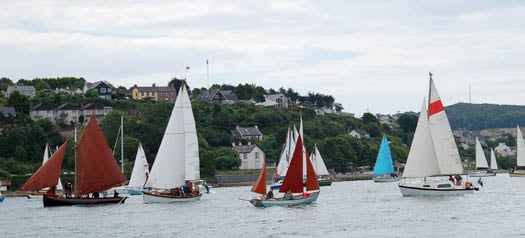
People sail boats of all types
Why is this?
Throughout my years of being a marine journalist and when marine correspondent within RTE, it was difficult to get coverage for sailing. I did achieve it, but there was always a bit of a battle to establish acceptance that the sport was not just for the wealthier part of the population, but that it permeated across all social milieu. I did get that message across by quoting figures of how many are actively involved in a day's racing organised by major clubs, compared with the attendance for example at some Irish soccer matches which got plenty of media coverage. I also stressed that it was a participative sport more than a spectator one. More people within the broadcast service have become involved in the sport. But generally in the media, there is still an impression that sailing is a sport for which you need a lot of money and this is perpetuated by the oft-quoted unfortunate analogy of standing under a cold shower and tearing up money.
But sailing – and yacht – clubs are also contributors to this failure to get the message of sailing as a sport for all across. In my experience as a journalist, most clubs are poor at their public relations and the issuing of information to the press, but yet complain that the sport does not get enough coverage, even if they do not provide the information. There are honourable exceptions, who provide good circulation of information and websites, but there are many other clubs who are pretty bad at sending information and whose websites are dismal failures, not updated for long periods of time.
At the annual meeting of the South Coast Offshore Racing Association in Kinsale Yacht Club in the Spring one participant told the audience that "yacht clubs to most people would be the scariest places to walk into."
Another said: "It is no wonder that we struggle as a sport to keep people as lifelong participants, even though we can and do attract younger people into the sport at an early age."
The warning signs have been there for years, for those who wanted to note them. Sailing needed to widen its appeal, to get more people into the sport for lifelong participation.
To survive a sport needs an organised structure and clubs are needed to provide this, they must have members who pay to join and support them. They cannot exist if people use them without joining and therefore not giving on-going financial and volunteer support.
So there is a dichotomy here. Why are clubs not getting enough members, a situation which appears widespread?
The economy over the past few years has undoubtedly been a contributory factor. People have lacked disposable income and, amongst families in particular, expenditure on non-essential matters has had to be cutback. Some clubs have responded with different arrangements for membership, but as I wrote in this blog last week, I still think that new, flexible approaches are needed, particularly to encourage crews, of which most active racing boats are short.
There are also people who sail and who do not join clubs, either they don't want to, or can't or there are not clubs close to them or for whatever reason. But they do sail, are they outside of the system and should they be considered. How can they be appealed to because they are involved in the sport. There are the traditional boats and the huge support they get. Some are members of the ISA, some of clubs, but many not so perhaps. There is a huge level of support for sailing in this sphere and many organised events which draw big support. Should the ISA reach out to these sailors, to this area of sailing activity?
This and many other aspects merit consideration to band together all interested in sailing, in all its facets. United in approach there would be a strong force which official authorities could not ignore when improved facilities and recognition are sought or when government and officialdom has to be challenged, such as in the imposition of new regulations.
On this month's edition of my radio programme, THIS ISLAND NATION, (click to play podcast above) I talked to the President of the Irish Sailing Association about his plan for a Strategic Review of the sport to deal with a decline and he accepted my suggestion that the impression of elitism is not good for the sport and has not helped its expansion and development. We also discussed whether there was too much concentration on racing and whether more support should be given to other forms of sailing, encouraging cruising.
David Lovegrove wants to get across the message that sailing is open to everyone. He would be particularly happy, he told me, if he could get that understood and accepted widely in public. We discussed how sailing can be a sport for all ages and for all people, with the uniqueness of enabling families to participate together if they wished. He recalled the time when he first got involved in sailing and the enjoyment and sense of friendship that abounded. Perhaps too, we agreed, there was less concentration then on being winners in racing and in high performance levels.
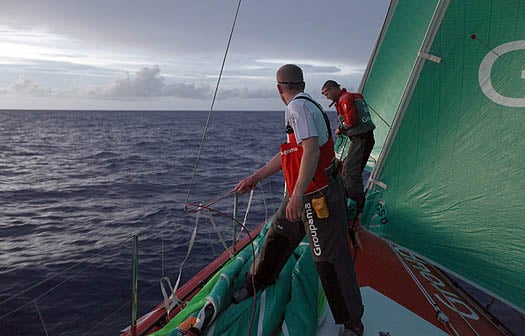
Ocean racer Damian Foxall of County Kerry
I think there is a need for Ireland to have a good presence on the international scene and that it is good for the country. It is also good for sailors to aspire to the highest levels of achievement, but have we got over-committed to competition to the detriment of the enjoyment of participation, of being on the water. Had the ISA also been too focussed on its own high performance programme and those who qualify for it and not given enough support to other sailors who may not have made it through the ISA system, but want to try on the international scene and should there be arrangements to support that. Also, for example, has the ISA been close enough to the top international sailors who have come from Ireland and sought to include them and utilise their services in promoting Irish sailing, such as Damian Foxall and Justin Slattery and where is the ISA in regard to the efforts of such as young David Kenefick making his own way onto the international scene through the Figaro Race.
All of these are interesting points to debate.
I take part in club racing, but I always try to make it clear to the crew that we are going out to enjoy ourselves and winning is not the overall aim, though it would be nice and we have been fortunate enough to do so from time-to-time. I don't like shouting on a boat, though sometimes getting something done quickly when needed can raise the vocal level. But if the enjoyment is taken out of the sport, that is not for the best.
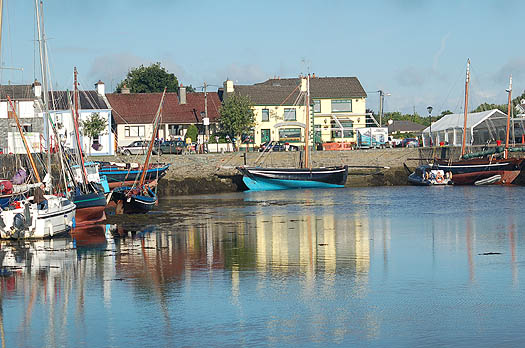
All forms of sailing need to be engaged
Again, here we have a dichotomy, other sports are hugely competitive-oriented, why should sailing not be?
There are issues to be addressed and I wish David Lovegrove and his team every success as they try to come up with answers. He told me in our interview, that this would not be a short-term solution, but would take a lot of work and commitment by the clubs themselves. Indeed. As I wrote in this blog last week, encouraging participation is essential to arrest decline. That will mean more innovative ways of involving people, a point which Denis Kiely, who has given tremendous national service to sailing made at that SCORA meeting in Kinsale and which impressed me.
He said that often crews did not get enough of a proper introduction to the sport, didn't have enough knowledge of it and weren't given such, didn't get training, could therefore feel unwelcome and then leave the sport.
Club marinas are pretty full of boats around the country, so it is at times hard to accept that there is a decline in participation, but the meetings which have led to the new approach by the ISA have shown problems, including dissatisfaction with the national association itself. David Lovegrove has accepted this and the need for change.
He spoke to me of his enthusiasm about the work ahead to re-define the sport and his confidence in the team he has appointed to oversee different aspects of the sport and to suggested changes. These are outlined in detail in the current/Summer edition of AFLOAT magazine.
His determination to create a strong, vibrant sport, is welcome. I wish him success with his efforts. Listen to his interview in my programme here on the Afloat website (above). Everyone interested in the future of our sport should respond positively. That commitment is what the sport needs.
So – who is to blame for the decline in sailing – all of us are, if we do not make changes to encourage more people into the sport and to stay in it and if we do not adapt existing systems to ensure they feel welcome. That means all of us who want to see sailing being a sport for all accepting that sailing is just that - a sport - not a badge of social approval.
Damian Foxall's Transat Jacques Vabre Start Postponed
#offshore – Violent low-pressure systems sweeping in from the West forced the Transat Jacques Vabre race committee to postpone the start of the 11th edition for the second time and to cancel the MOD70 20nm prologue for the Sultanate of Oman's flagship campaign Oman Air-Musandam and their competitor, Edmond de Rothschild.
Originally planned for Sunday, weather conditions delayed the scheduled start to Monday for the IMOCA 60s, Class 40s and Multi 50s, with a prologue planned for the two MOD70s, but late Sunday night the race committee decided to further postpone until Thursday at the earliest for all except the MOD70s that might be able to slip out on Wednesday.
"Starting this race in November is always challenging, we had a low pressure come through last night and there is another one coming through tomorrow and the most important thing for the race committee is to get us off safely," said Damian Foxall from Ireland who has over 350,000 nautical miles behind him, a recent Volvo Ocean Race win with Groupama and is on his third Transat Jacques Vabre.
Oman Air-Musandam skipper, Sidney Gavignet (FRA), who has his fair share of single-handed, double-handed and Volvo Ocean Races under his belt explained the challenges that the race committee faces: "The fleet is made up of very fast boats with the MOD70s; intermediate boats with the Multi 50s and the IMOCA 60s and then the Class 40s which are a bit slower and mixed amateur and professional crews. For this reason it is very difficult to find a window.
"It is easier for us because we go quickly so we need a small window of opportunity to get out of the English Channel and to Finisterre from where we can consider we are in good shape, still very safety conscious, of course, but looking for speed as well. For the Class 40s it takes some time to get out of the Channel and through Biscay, so it is more complicated," he said.
"The MOD70s are very seaworthy boats, they are one design, well built and really reliable. We have been sailing them hard all year in very rough conditions, but of course with the current conditions of very high westerlies blowing against the tide, the sea state is very steep and rough. They are boat-breaking conditions out there right now," added Damian.
For the race organisation sending a fleet of 43 boats out – that is 86 people on the water – is a major decision and a big responsibility. "It is hard. I think they made the right decision to delay, these conditions are boat breaking – in Biscay there is a 4 to 5 metre sea state whipped up by the westerlies that have been blowing for the last three days, but now the challenge is to find the right window to start," said Sidney.
In the meantime, the Oman Air-Musandam duo will continue with their routine of gym, weather checks and boat checks until the race committee calls for a start.
"We are ready to go and looking forward to the warmer weather in the South!" said Sidney as the skies opened once more over Le Havre.
TV Interviews with Damian Foxall (IRL) and Sidney Gavignet (FRA) in French and English on the weather and the postponement will be available from 1800CET
Damian Foxall Set for 2013 Transat Jacques Vabre on Oman Sail
#TJV – Ahead of the Transat Jacques Vabre (TJV) in November, Oman Air-Musandam skippers Sidney Gavignet (FRA) and Damian Foxall (IRL) are leaving no stone unturned in their preparations to become the first MOD70 champions of the event.
Throughout the month of September, having qualified for the TJV by competing in the Rolex Fastnet Race in August, they have been putting their skills and temperaments to the test with a series of weather workshops, offshore challenges against MOD70 rivals and some heavy-duty training camps at the offshore training centre at Port La Foret in France.
They have been observed for compatible strengths and weaknesses and as a result, decided on a three-hour on three-hour off watch system that they believe will work well for them as they find a balance between pushing the boat hard and safe sailing.
"The most important thing about competing in a one-design boat is not only boat speed but avoiding mistakes in terms of breaking things or making bad manoeuvres and working out the best way to go," said Gavignet, who estimates the 5,450nms course from Le Havre to Itajaii in Brazil will take around 14 days.
"It is important that we understand the key moments of the race and when to push and when to ease up. We also need to understand energy management because bad decisions are mainly caused by fatigue so we have always to be aware of that.
"We have done a weather course with Jean-Yves Bernot – we did the same course before the Route des Princes which was very useful and makes us aware of the different scenarios so that we are prepared for them."
This is not the first time Gavignet and Foxall have competed together in a two handed transatlantic race (in 2008, they raced the Transat AG2R together, finishing in fifth place), but during the 2013 Route des Princes campaign in the summer and in subsequent training, they have identified a shared characteristic that they realise will require conscious moderating.
"In terms of skills, we have similar profiles but we both push the boat hard so we have to take it easy, keep a clear mind and slow down. Think more and act less. It is both a strength and a weakness," Gavignet said.
For Foxall, Ireland's most successful offshore sailor with two Volvo Ocean Race wins under his belt as well as his Barcelona World Race victory in 2007-08, the TJV is unfinished business after he was airlifted off Orma 60 trimaran Foncia when he and co-skipper Armel Le Cleach capsized.
That was eight years ago and although he is confident he and Gavignet can fend off challenges from the other two MOD70s Virbac-Paprec 70 and Edmond de Rothschild, he is under no illusion how difficult it will be.
"Of all the sailing I have done, this is without doubt the most demanding," he said.
"If you have too much sail area up on a multihull, it can be terminal and there are only two people to deal with it. Having said that, the boats require to be pushed and you push it much closer to 100% than you would if you were single-handed.
"It is very important at all times to be in control and always have one, if not two ways of depowering the boat.
"We'll push the boat hard but stay within the limits. Having too much sail area is not necessarily the fastest way to go forward."
Between now and the start of the TJV on Sunday 3 November, Gavignet and Foxall will continue their training sessions at Port la Foret with more test sailing before leaving for Le Havre around the 22 October.
Campaigning Oman Air-Musandam in the 2013 Route des Princes, Gavignet and Foxall were lucky to be part of a crew of six including Omani sailors Fahad Al Hasni and Ahmed Al Hasni but for the Transat Jacques Vabre, while Fahad will be supporting the crew with preparations and training sessions and observing to further his ability, he won't be racing this time.
"While I have learnt a lot already and am training as much as possible, it will take a few more years of experience for me to be ready for a two-handed race like this," said Fahad who will be on site in Le Havre for the start to support Sidney and Damian. "The MOD70 is a challenging boat and while I have learnt a huge amount sailing it crewed, and one day hope to race this event, for now I am supporting my team mates with their preparations."
The TJV starts from Le Havre on 3 November but to ensure all classes arrive in Brazil at around the same time, the MOD70s will start with the rest of the fleet but race just 40 miles in a prologue to decide the starting sequence when they start again on 8 November.
Coming up:
Training session in Port la Foret 23-26 September
Foxall's Omansail MOD 70 Crew Still Keen on Round Ireland Speed Record
#roundireland– In spite of identfiying a weather window for a bid on the Round Ireland speed record early yesterday morning, Sidney Gavignet and Damian Foxall's French based Oman Sail cancelled their attempt when the weather forecast changed. It is the third time this year that Ireland's Damian Foxall and the team of Omansail have ditched plans for an attempt on the speed sailing record.
Instead of a circumnavigation of Ireland, the MOD70 trimaran, completed a training run between its home base at L'Orient, France and the Fastnet Rock off the Cork coast, according to the World Speed Sailing Record (WSSR) Commissioner in Ireland, Chris Moore, at the National Yacht Club.
For a time it looked like an anti–clockwise bid might produce the required conditions on Sunday to break the 44-hour time, coincidentally marking the 20th anniversary of the 1993 record set by Steve Fossett, Con Murphy and Cathy MacAleavey.
Foxall and the crew came to Ireland in March for a dedicated attempt but were beaten back by gales on the Welsh coast. Their attempt was also foiled by the weather in June too. For now, the 20–year record set by the late adventurer Steve Fossett on the Lakota Catamaran lives on. Perhaps Foxall and Omansail might make it fourth time lucky sometime soon?
Damian Foxall Prepares for Fastnet Challenge
#fastnetrace – Ireland's Damian Foxall says he is expecting any kind of weather for this week's Fastnet race. The Irish man is a key crew man on the Oman Air Musandam MOD 70, the the first Omani yacht to take part in the Race. Round the world sailors, Foxall and Dee Caffari talk about the iconic race around the Fastnet in this video (above). Foxall has started nine round the world races and won the Barcelona Race with Jean Pierre Dick and the Volvo Ocean Race with Groupama.
Ireland's Damian Foxall Gears up for Isle of Wight Challenge
#cowes – Ireland's Damian Foxall is among some of the biggest names in offshore ocean racing gearing up to take on the Isle of Wight in the 2013 Artemis Challenge at Aberdeen Asset Management Cowes Week on Thursday.
The fleet boasts some of the most experienced big boat sailing stars from the UK and France. And they will be joined by a number of VIP guests as they bid to claim £10,000 for their nominated charities.
While the 2012 race saw Michel Desjoyeaux set a new world record onboard his MOD70 Foncia for circumnavigating the Isle of Wight, the forecast for Thursday suggests a challenge to the record is unlikely.
But it won't stop these sailing greats pulling out all the stops to be first across the finish line.
At 10 AM on Thursday August 8th, an impressive fleet of two 70ft+ trimarans and seven IMOCA 60s will set off from the start line at the Royal Yacht Squadron at Cowes and sail clockwise (East) around the Isle of Wight (course distance and set-up will be dependent on the wind conditions).
The multihulls will be skippered by two well known French skippers, Sidney Gavignet (with Foxall) and Seb Josse, helming Oman Air-Musandam and Gitana respectively. Oman Sail will also be hosting British Olympic sailing medallist Paul Goodison and celebrated solo yachtswoman Dee Caffari.
The fleet of IMOCA 60s brings together the cream of the Vendée Globe, including the winner of the 2012 edition of the renowned solo race, Francois Gabart on Macif, who will be joined by legendary sailor and mentor Michel Desjoyeaux. Flying the flag for British sailing will be Alex Thomson on Hugo Boss, Brian Thompson on Artemis Ocean Racing and Mike Golding on Mike Golding Yacht Racing. Alex will be joined by rising British actor Douglas Booth whilst Artemis Ocean Racing will host celebrated chef Mitch Tonks, who commented: "It is just brilliant to be involved with the Artemis Challenge – food and sailing are two of my favourite things in life so to get on board one of these boats will be a dream. I can't wait."
The fleet of IMOCA 60s is completed by a number of decorated solo sailors with Vincent Riou sailing on PRB, Bernard Stamm on Cheminées Poujoulat and Marc Guillemot on Safran (see list below for full details of entries). An overall Artemis Challenge Trophy will be awarded to the winning team with the best added elapsed time. Each team is made up of several IMOCA 60s and one of the trimarans, which will be decided on the morning of the race. £5,000 will be donated by Artemis Investment Management to the winning teams' charities of choice and £2,500 will also be donated to the fastest IMOCA 60 and the fastest trimaran to cross the finish line.
Set–Back for Foxall as Jury Rules Against OmanSail
#rdp13 – Damian Foxall's Oman Sail's MOD70 team has incurred a four-point penalty for a rule infringement at the start of Leg 2 of the 2013 Route des Princes in Lisbon on Sunday 16 June.
The International Race Jury, led by former Irish Olympic sailor Bill O'Hara, was convened in Dun Laoghaire on Friday evening to hear a protest from Spindrift relating to an infringement by the Oman Sail MOD70 team of Racing Rules of Sailing 11: When boats are on the same tack and overlapped, a windward boat shall keep clear of a leeward boat.
After a hearing lasting 80 minutes, the Jury found in favour of Spindrift and imposed the four-point penalty, equivalent to one place on an offshore leg on the Omani boat.
After such a close and hard fought leg 2 from Portugal to Ireland, skipper Sidney Gavignet was very disappointed at the result: "This MOD70 racing is incredibly close, especially on the start line and although we didn't think that we infringed Spindrift, we of course respect the jury's position and look forward to getting back on the race course on Saturday to start to regain the points we have lost," he said.
The third round of Route des Princes inshore racing starts tomorrow (Saturday) afternoon and continues on Sunday. The start of leg 3 from Dun Laoghaire to Plymouth is scheduled for Monday at 1100 local time.


























